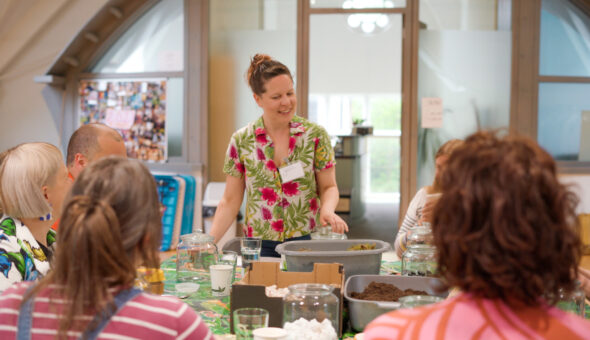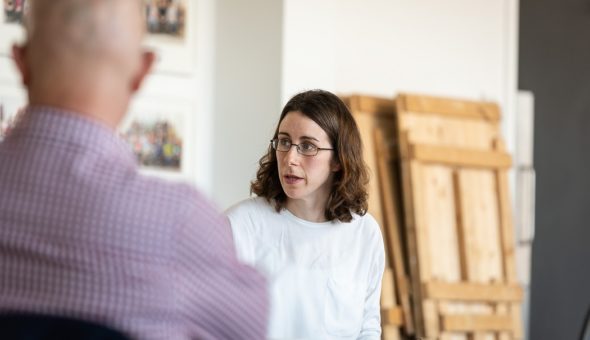Have you noticed it? There is a potentially tectonic shift happening right now in how funders are working, shifts that will have a significant impact on our work as public engagement professionals. But is this change sustainable and will it have the desired effects?
A historic moment: research and innovation at the heart of society and the economy
That headline statement and the implication of it are woven through the whole of the UK Research and Innovation’s (UKRI) five-year strategy. It feels like a culmination of a few years’ worth of work by funders which has shifted thinking around how research and society interact.
Wanting to foster greater trust between research and society isn’t really new. Just think about programmes around Public Engagement with Research, Public Patient Involvement, Participatory Research, Participatory Action Research, Knowledge Exchange, Civic Engagement, Ethics, Open Research, Concordat for Research Integrity, REF, KEF, Public Dialogue, Living Labs, and Science Shops. Some of these are approaches to research, some are additional to research, some operate at an institution level, and some operate at the research project level. But all are about greater accountability to the public who fund research and aligning research to the needs of those who can benefit from research.
But the increased importance and emphasis by funders and decision-makers on how society and research interact now that is new.
This has got us thinking here at the Public Engagement Unit about our work and what this shift means more widely for our sector.
Power imbalances
As a community of public engagement professionals, we have all largely used the NCCPE’s definition of public engagement, and the University of Bath is no exception. While our work focuses solely on research the ‘for mutual benefit’ part of the definition is an important characteristic that we use to inform the development and delivery of public engagement with research (PER) activities.
But, let's be honest, with funding for much of this work coming directly to universities, there is an incredible imbalance of power that makes it hard to claim “mutual benefit” because researchers and universities hold the cash.
Investing in communities as well as universities
This funding that has been invested since 2008 hasn’t just been about doing engagement with research, it’s been about fostering positive cultures of public engagement with research, about culture change within universities to create capacity and capability for public engagement with research. While we’ve been fortunate to be in receipt of this funding and we are pleased to have been able to do the work we have done, there has been an unspoken assumption that communities have the capacity and capability to engage with research.
It is now very apparent that there hasn’t been a parallel investment in communities / public groups to develop their capability and capacity to engage with research.
Over the last few years, this has been changing with schemes such as Wellcome and the British Science Association’s Ideas Fund, UKRI’s Enhancing Place-based Public Engagement and Citizen Science Collaboration grant schemes and the Community Research Network and Community Knowledge Fund calls, all looking to understand how to redistribute power from universities and into communities.
A narrow view of involving and engaging people with research
This is all good. We are not going to knock opening up relationships between research and society, we are not going to suggest that funding (and power) doesn’t need redistributing.
However, there is an issue.
Most of these recent initiatives, in particular from UKRI, focus on the practice of research. We see phrases like “public help shaping new range of research on issues that impact their lives” [Enhancing Place-based Public Engagement], communities being “embedded in the research process” or “having influence over what is researched and how it is researched” or “doing engaged research”. Again, this is ALL GOOD STUFF.
This approach is based on an assumption that people and communities want to be involved in research in this way. Indeed, it seems like this is the only form of engagement that we can envision.
Yet, when we talk about public engagement with research our scope is much broader, we talk about activities that inform people, that listen to them, where we collaborate with them and where we empower them.
Listening to communities
In the course of our work supporting researchers to engage people with their work, we have always had a commitment to listening to and meeting the needs of communities outside of the University.
Through various listening exercises (most recently with our ParticipatoryResearch@Bath listening exercise) and informal everyday conversations, we’ve heard how our local communities see the University through a narrow window of their own experiences - living next door to a student or attending a public lecture - and that there is very little individual or collective understanding of research.
What research is, how it’s funded, who does it, who benefits from it, and who regulates it are largely invisible.
With this insight, imagine for a moment what the response might be to the invitation from the University of Bath to be involved with research to “shape the research agenda” or “to be embedded in the research process” if your only experience of ‘research’ is having visited a science festival a couple of years ago?
Committing to being an active part in research is a huge ask of people not already involved and could potentially only ever attract the ‘usual subjects'. We can’t expect people to get up to speed from a standing start.
In fact, we could argue for some communities we’re not starting from a standing or neutral start, we’re actually starting from a potentially negative start. One theme that often emerges when we talk to certain communities is that there is a reluctance to be involved as they feel ‘over-researched’. When we think of engaging with communities to get them involved in research, there is history (good and bad), and that should be taken into account.
So, for us, it feels like there is a disconnect between what is happening through initiatives led by organisations such as UKRI which focus on in-depth collaborations for research and what our communities actually want and need.
Community-based engagement
To realise the ambition of research for societal benefit, it is clear there needs to be an investment in communities to enable them to engage with research in ways that are meaningful to them and help them meet their priorities. With this, the approach taken to engagement with communities by universities needs to change from being transactional in nature to more relational.
We should assume that the top-level shifts in focus from funders we’ve mentioned will trickle down to how research proposals are awarded and a much greater focus on citizen involvement in research proposals and throughout the research process will be core to successful research grants. Investing in systems within communities so that citizens that do want to be involved and contribute to research know how to makes business sense.
Helen Featherstone is Head of Public Engagement at the University of Bath
Respond



